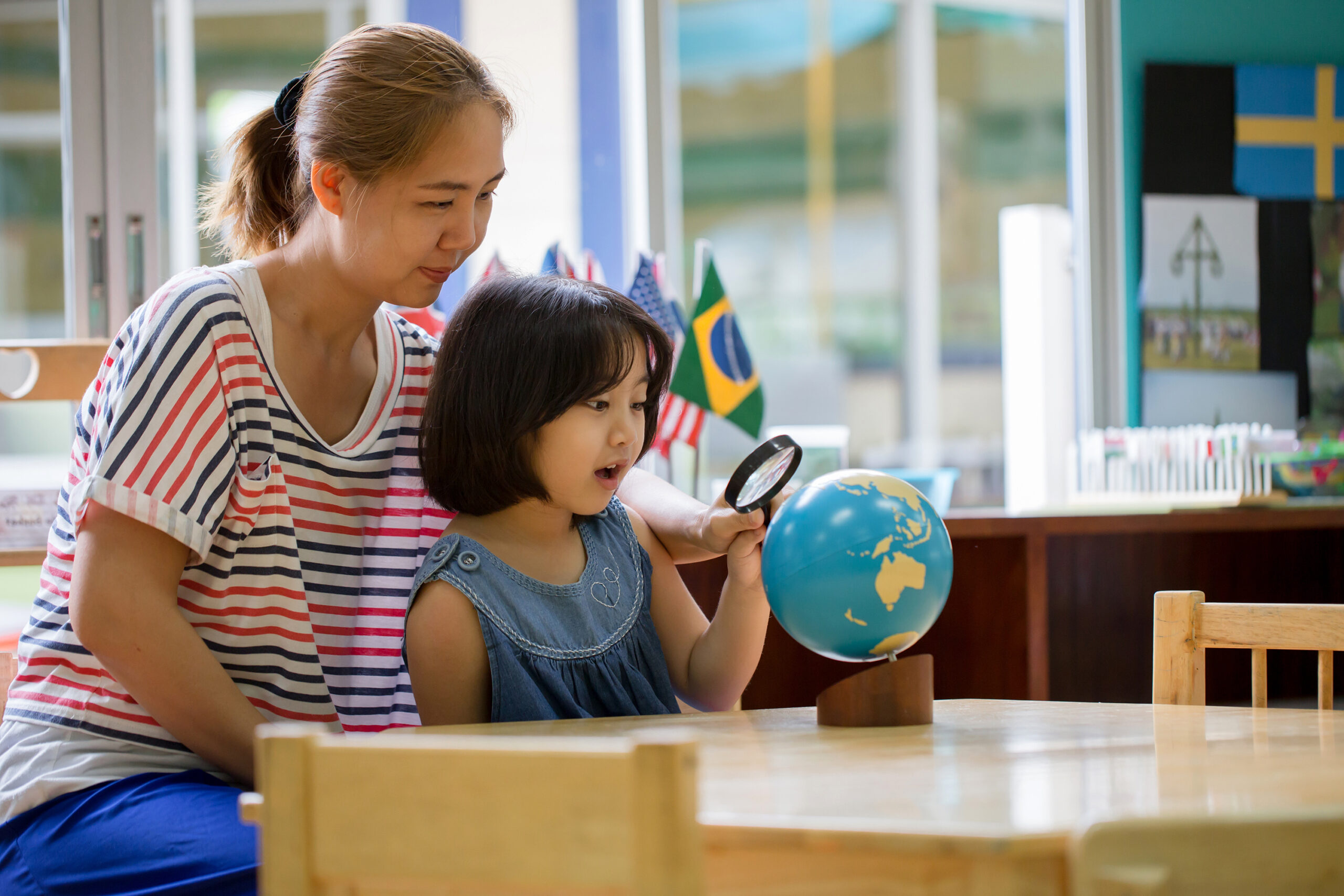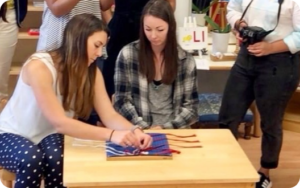At the heart of the Montessori method is the Montessori teacher, also known as a guide, who plays a pivotal role in crafting a nurturing and stimulating environment conducive to growth and exploration. Unlike traditional teachers who linearly lead the classroom with give and take from the students, Montessori teachers serve more as facilitators of learning, carefully preparing classroom environments that encourage children to engage with materials independently. This distinct role requires a deep understanding of the Montessori philosophy and an unwavering dedication to observing and supporting each child’s unique journey.
The Montessori method, a revolutionary approach to education developed by Dr. Maria Montessori, emphasizes independence, freedom within limits, and respect for a child’s natural psychological, physical, and social development. Unlike traditional educational systems, Montessori education focuses on individual progress and development, fostering a love of learning by allowing children to explore activities and concepts at their own pace. This approach ensures that education is seen not as a one-size-fits-all model but as a journey of discovery tailored to each child’s unique needs and potential.
The Montessori teacher’s significance transcends mere instruction, encompassing nurturing a child’s curiosity, independence, and love for learning. By providing a balanced environment that meets educational standards while honoring the child’s innate desire to explore, Montessori teachers empower children to become confident, self-motivated learners. This nurturing setting supports academic achievement and the development of the whole child emotionally, socially, and intellectually, laying a solid foundation for a lifetime of learning and growth.
Morning Preparation
Arrival and Classroom Setup
The day of a Montessori teacher begins with an early arrival to the classroom, a time cherished for its tranquility and potential. This period of preparation is not just about organizing materials but also about cultivating an environment that invites curiosity and learning. The teacher meticulously reviews the classroom, ensuring each material on the shelf is complete and inviting of discovery.
This might involve rotating materials based on the student’s interests or developmental needs, refreshing areas that encourage practical life skills, or setting up new challenges that subtly guide children toward more complex concepts. Preparing the classroom is a thoughtful, deliberate process that reflects the teacher’s deep understanding of the Montessori method and the individual needs of their students.
Additionally, and most importantly, the teachers may take some time to prepare themselves for the day mentally and emotionally. It is important to be ready for the children, showing up as their best selves every morning.
Welcoming Students
As children begin to arrive, the classroom atmosphere shifts from quiet anticipation to a gentle hum of activity. Each student is greeted warmly by the teacher, always by name and often with a handshake or hug, fostering a strong sense of belonging and community from the moment they enter the door. This personal touch is crucial in the Montessori classroom, helping to build a secure and nurturing environment where children feel seen, valued, and understood. The teacher’s welcoming presence reassures students, providing a consistent, comforting start to their day. This ritual of greeting not only strengthens the emotional connection between teacher and student but also reinforces the classroom as a community of learners who respect and care for one another. You even see children greeting each other in the same way as they too are happy to see their friends arrive for the day.
Guided Learning and Observation
Facilitating Independence
In a Montessori classroom, the teacher plays a vital role in fostering student independence. The teacher actively encourages self-directed learning by allowing children to freely choose their activities from a range of options meticulously prepared and presented one-on-one by the teacher.
The teacher designs each material and activity in the classroom to support specific developmental objectives and captivate the children’s natural curiosity. The teacher then gives formal presentations of the materials to the children one at a time or in small groups. Once a child has been presented a material, they are typically free to return to practice it anytime they would like. The teacher guides the students in selecting tasks that challenge their skills while also aligning with their intrinsic interests. This empowerment of choice is fundamental to the Montessori method, enabling children to take ownership of their learning process.
The teacher remains a facilitator, offering subtle guidance and support only when necessary, thus promoting an environment where students can develop self-confidence, self-discipline, and the joy of discovering solutions independently. The teacher is also trained to meet the needs of children with various and different learning styles. Each child is unique and the teacher works toward helping each child reach their full potential.
Observation
A cornerstone of the Montessori teacher’s role is observation. The teacher constantly monitors the students’ engagement with the materials, their interactions with each other, and their overall behavior within the environment. These observations are critical, as they inform the teacher’s understanding of each child’s developmental progress, interests, and potential areas for further growth.
By watching how a child interacts with an activity, the teacher can assess whether the child is ready to move on to more challenging materials or perhaps needs additional support in a particular area. These insights enable the teacher to tailor future lessons to the needs and readiness of each student, ensuring that the educational experience is personalized and effective.
The teacher’s observations also extend to the social dynamics within the classroom, guiding them in facilitating interactions that promote empathy, collaboration, and respect among students. Through keen observation, the Montessori teacher becomes adept at creating learning opportunities that are both meaningful and inspiring, guiding each child on their unique educational journey.
Challenges and Solutions
Addressing Individual Needs
Montessori teachers face the challenge of meeting the diverse developmental needs of each child in their classroom. They tackle this by crafting personalized learning paths that cater to each student’s unique pace and interests. This approach ensures every child feels valued and understood, promoting an inclusive learning environment that celebrates individual progress.
Maintaining Classroom Harmony
Creating and maintaining a cooperative and respectful classroom atmosphere is pivotal in Montessori. Teachers implement strategies for fostering this environment, such as embedding conflict resolution techniques and promoting student empathy. By guiding children to understand and appreciate differences, Montessori teachers nurture a community of learners who support and care for one another, thereby ensuring a harmonious classroom dynamic.
The Joys of Teaching Montessori
Witnessing “Aha” Moments
As a Montessori teacher, few experiences are as gratifying as witnessing a student’s “aha” moment, that clarity and understanding when everything clicks into place. Whether it’s mastering a new math concept, discovering the intricacies of language, or unlocking the mysteries of the natural world, these moments of discovery are pure joy.
Fostering Lifelong Learners
One of the most rewarding aspects of teaching in a Montessori classroom is witnessing children evolve into lifelong learners, curious, independent thinkers who possess a genuine love for learning. Montessori education instills in children a deep-seated desire to explore, question, and discover, setting them on a path of intellectual curiosity and self-discovery that extends far beyond the classroom walls. It’s immensely fulfilling to see children develop the confidence to pursue their interests, tackle challenges with resilience, and approach the world with a sense of wonder and awe.
Afternoon Activities and Reflection
Group Activities
In the Montessori classroom, work time is a harmonious blend of individual work and group activities, fostering both independent exploration and social interaction. While the teacher often focuses on individualized lessons during morning work time, the afternoon presents the teacher with opportunities for group lessons and collaborative endeavors.
Group activities, carefully curated by the teacher, provide a platform for students to develop essential social skills such as communication, cooperation, and teamwork. Whether working together on a science experiment, engaging in a group discussion, or participating in a collective art project, these activities cultivate a sense of community and belonging among students.
Through meaningful interactions with their peers, children learn to appreciate diverse perspectives, resolve conflicts amicably, and celebrate shared achievements, laying the foundation for lifelong social-emotional growth.
Reflective Practice
At the end of each day, the Montessori teacher engages in reflective practice, a crucial aspect of professional development and continuous improvement. This reflective process involves introspection on the day’s outcomes, student progress, and the effectiveness of instructional strategies.
The teacher considers which activities resonated with the students and sparked their curiosity, as well as areas where further support or modification may be needed. By examining student engagement, understanding, and challenges encountered throughout the day, the teacher gains valuable insights into the effectiveness of the curriculum and teaching methods.
Equipped with this knowledge, the teacher refines lesson plans, adjusts learning materials, and identifies opportunities for individualized support to meet the diverse needs of each student. Reflective practice empowers Montessori teachers to evolve as educators, fostering a culture of continuous learning and improvement that benefits both students and teachers alike.
Continuous Learning and Community Engagement
Professional Development
Montessori teachers are deeply committed to their ongoing professional development, recognizing that their journey as educators is a continuous one. They actively seek opportunities for growth and learning, attending workshops, webinars, conferences, and seminars to stay abreast of the latest research, teaching methodologies, and Montessori certification updates.
By investing in their own learning, Montessori teachers enhance their ability to create dynamic and engaging learning environments that meet their students’ evolving needs. Moreover, their dedication to continuous improvement underscores their unwavering commitment to providing the highest-quality education possible.
Engaging with Parents
Communication with parents is integral to the success of the Montessori classroom, as it fosters a strong home-school connection and promotes collaborative partnerships in children’s education. Montessori teachers prioritize open, transparent communication with parents, sharing insights into their child’s development, progress, and achievements.
Through regular updates, parent-teacher conferences, and informal conversations, teachers provide valuable feedback and guidance, empowering parents to support their child’s learning journey both at home and in the classroom. By fostering a sense of partnership and mutual trust, Montessori teachers and parents work together to create a supportive, nurturing environment where children can thrive academically, socially, and emotionally.
Montessori teachers play a vital role in shaping young learners’ educational experiences and lives. With dedication, compassion, and a deep understanding of the Montessori philosophy, these educators create nurturing environments where children thrive academically, socially, and emotionally.
As a Montessori teacher, the opportunity to contribute to a child’s growth and development in such a unique educational setting is profoundly fulfilling. Witnessing the joy of discovery, the spark of curiosity, and the blossoming of independent thinkers reaffirms the importance of this noble profession.
If Montessori education’s transformative impact inspires you and you wish to embark on your own journey as a Montessori teacher, consider enrolling in Montessorita’s programs. Our comprehensive teacher education courses will equip you with the knowledge, skills, and passion needed to become an effective Montessori educator. Join us in shaping the future of education and making a difference in the lives of children. Enroll now at Montessorita and embark on a rewarding career in Montessori education.



